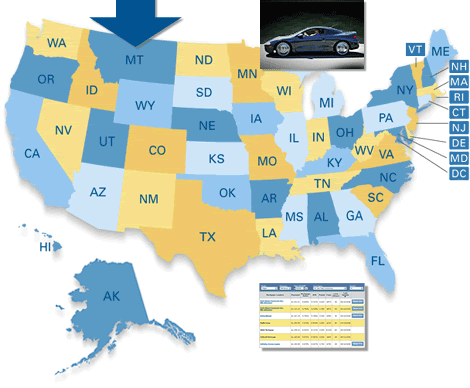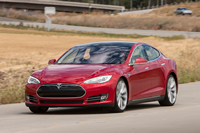Electric vs. Hybrid Cars
by Amy Lillard
(4/13/2013) Electric cars may be the future of the automotive industry. Cars like those manufactured by Tesla represent an exciting new advancement for consumers and the environment. But what do you need to know when considering an electric car? In this series, we examine key information to help you step into the future.
For consumers accustomed to gas-powered vehicles, transitioning to an electric vehicle can seem a little intimidating. With new things to consider and manage, like driving range, charging stations, and a different cost structure, many car buyers opt for what’s familiar instead.
But for those intrigued by the possibilities of an electric car and encouraged by the prospect of reducing their environmental impact, a hybrid represents a good “starter” option.
A hybrid vehicle is what it sounds like — a combination of a gas- and electricity-powered car. An electric motor supplements the traditional gas-powered internal combustion engine, reducing overall gasoline use and maintaining good performance. The hybrid is an option that’s become increasingly popular over the last decade because it combines some of the best qualities of the two types of cars:
• Fuel economy. The energy provided by electricity increases a car’s efficiency. The design, which recharges the car’s battery partially through regenerative braking energy, makes for much lower operating costs over time and less need for gas.
• Reduced maintenance. Cars powered by electricity require much less maintenance as their engines are less complex. The battery is the only major component that must be maintained and replaced. Hybrids still have an internal combustion engine, which requires oil changes and other routine maintenance. However, there will be less frequent brake replacements due to the regenerative braking model.
• Reduced environmental footprint. Since hybrids run partially on electrical energy and less on gas, they inherently reduce tailpipe emissions, identified as a major contributor to pollution and greenhouse gas. In addition, with reduced need for gas, there is less environmental damage caused by drilling.
• Increased range. Pure electric vehicles are limited in their range, driving up to 100 miles on a single charge. Hybrids allow you to use electricity on shorter trips and until the charge is gone, then switches to gas when charge diminishes or for longer trips. It prevents the worry about running out of juice on a trip.
• Tax credits. Electric vehicles qualify for a number of federal and state tax incentives that lower the ultimate purchase price. Hybrids, since they use partial electric energy, also qualify for certain incentives that can help lower your taxes.
For Additional Reading:
Great Rivalries: Hybrids vs Electric Vehicles:
http://www.automobilemag.com/green/news/0909_hybrid_vs_electric_vehicles_great_rivalries/
How Hybrid Cars Work:
http://www.howstuffworks.com/hybrid-car1.htm
Owning a Hybrid or Electric Car:
http://greenliving.nationalgeographic.com/owning-hybrid-electric-car-2352.html
Other related articles:
Five Drawbacks of Electric Cars
Misconceptions about Electric Cars
The Return of Electric Cars: How An Old Favorite Made a Comeback
Top 5 Reasons to Buy an Electric Car
Electric Cars: Is it Right for You?
Electric Cars: Buying Considerations
Electric Cars: Top 5 Things to Know
Automotive Loans: Determining a Down Payment
Automotive Loans: The Truth About "Add-Ons"
Automotive Loans: How Much Car Can You Afford?
Automotive Loans: Applying for a Car Loan
High MPGs and low auto loan rates can save you thousands of dollars
Research your options when shopping for an auto loan
New and Used Auto Loan Rates
Choose Your State Below

Start by selecting your state

Amy Lillard
The ERATE® Resource Guide to No-Closing-Cost Refinancing
Principal Reduction: New Programs, More Controversy
Understanding Mortgages: Mortgage Paperwork
Understanding Mortgages: Types of Mortgages
Understanding Mortgages: How to Get a Mortgage
Understanding Mortgages: Buy or Rent?
Understanding Mortgages: Working with a Real Estate Agent
Understanding Mortgages: Working with a Real Estate Agent

Automobile Buying/Financing
5 Steps to Find the Perfect Car
Auto loan defaults to rise 7 percent in 2010
Auto Show Season Tips for Buyers
Consumer Reports suspends recommendations for Toyota's recall models
When is the Best Time to Buy a New Car?
Making a Vehicle Purchase? Enjoy These Helpful Tips
Chances are, your next car will be used. Drive a hard bargain
What your car is really saying
2012 President's Day auto sales among best ever
Special Report: Hitting the Brakes on Auto Dealer Loans
Auto Insurance
Buying Ins - Shopping for Insurance
Best Car Insurance Plan for You


